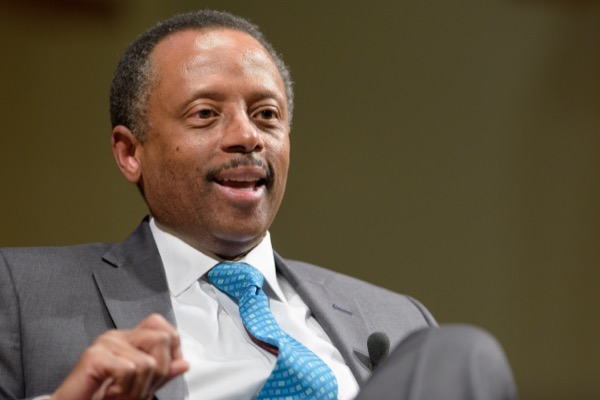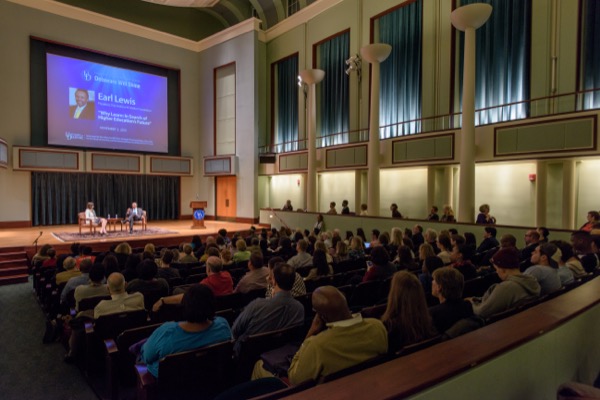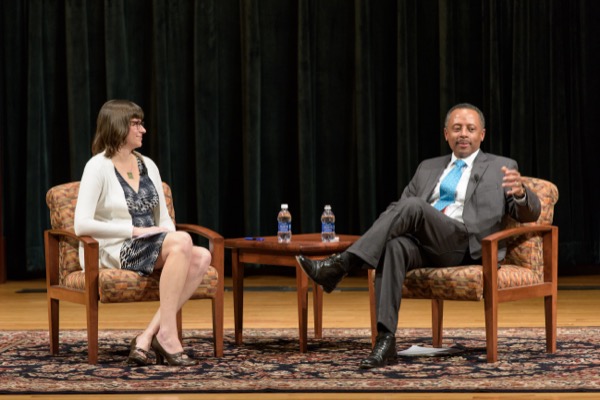


Beauty or beast?
Mellon Foundation's Earl Lewis speaks to the future of American higher education
(Editor’s note: A videotape of the presentation by Earl Lewis is available on UD’s YouTube channel. Prior to the evening presentation, he spent the day talking to UD students, faculty and staff in a series of events.)
11:54 a.m., Nov. 6, 2015--Some observers view American higher education as the best in the world – “a beauty” – while others call it too expensive and irrelevant – “a beast” – said Earl Lewis, president of The Andrew W. Mellon Foundation. The question is how this “song” will play out in the future.
Lewis, speaking in the Thought Leader Series at the University of Delaware on Nov. 3, began his answer with a family story.
Campus Stories
From graduates, faculty
Doctoral hooding
His grandmother, Susan James, the daughter of slaves, twice saved money, with the intent to go to St. Augustine College in Raleigh, North Carolina. Twice, however, the money needed to be diverted to a family crisis — to save an older brother from losing his home.
“She passed her dream forward,” said Lewis. His grandmother would send each of her three children to college.
Lewis was influenced greatly by his grandmother, as well as by his grandfather, who told him, “Education is the only thing that can’t be taken away from you.” As an incentive, his grandfather gave dimes, quarters and dollars for good grades.
So it was never a question of whether Lewis would go to college, but, rather, where.
He would earn an undergraduate degree in history and psychology at Concordia College and a doctorate in history from the University of Minnesota. He would hold faculty appointments at the University of California at Berkeley, the University of Michigan and Emory University and serve as Emory’s provost and executive vice president for academic affairs.
In 2013, Lewis became the sixth president of the Mellon Foundation, which has as its mission “to strengthen, promote, and where necessary, defend the contributions of the humanities and the arts to human flourishing and to the well-being of diverse and democratic societies.”
Lewis pointed out that in the 1970s, when he was in college, the future hinged on the value of a college degree, as industrial jobs started moving offshore. But what about now: Is higher education still worth it?
How we answer that question, Lewis said, is as important to the next chapter of America’s future as it was four decades ago.
“We need to focus on what it means to be educated,” he said. “Skills development is not the same as education.”
To underscore that point, Lewis quoted from Albert Einstein’s response to Thomas Edison when Edison said a college education is useless: “It is not so very important for a person to learn facts. For that he does not really need a college. He can learn them from books. The value of an education in a liberal arts college is not the learning of many facts but the training of the mind to think something that cannot be learned from textbooks.”
Lewis said the need for higher education will only grow, but that higher education has to resist the temptation to divide the world between STEM (science, technology, engineering and mathematics) and non-STEM fields because tackling society’s challenges will require them all.
And the ivory tower can’t be continued.
“It must be in the world,” Lewis said.
The path of U.S. higher education
Since the first academic institutions were founded in the U.S., starting with Harvard in 1636, American higher education has periodically gotten injections of innovation.
The Morrill Act, signed into law by Abraham Lincoln in 1862, established Land Grant colleges, which connected universities more closely to the nation’s agricultural well-being and to society. The next innovation was borrowed from Germany — doctoral programs — expanding the idea that universities are tied to knowledge production.
Following World War II, Vannevar Bush pushed for federal investment in research and technology, which led to the creation of the National Science Foundation (NSF).
NSF’s budget is $7 billion today, while investments in the National Institutes of Health have increased from $8 million in 1947 to $31 billion today. Meanwhile, support for the humanities is at $152 million each for the National Endowment for the Humanities and for the National Endowment for the Arts.
The number of colleges has increased from 152 in 1942 to over 3,600 today. In 1949, roughly 2.2 million 18-24 year-olds were enrolled in baccalaureate programs compared to nearly 14 million now.
Yet access to college is only part of the story; completion is the other.
Nationwide, the graduation rates at universities range from 20 percent to 96 percent, and half the students who enter doctoral programs don’t finish.
“We can’t afford to waste talent,” Lewis said. “The future will require us to use all that talent.”
“When we admit you as freshmen, we assume you can do the work. How do we ensure competencies?” he asked, suggesting moving away from an assessment for selection to an assessment for learning. “What if all universities became ACT-optional?”
Lewis said that graduate students should be “deeply educated and broadly trained” and also be exposed to the science of learning and pedagogical design because no matter where they end up, they will be teaching, helping students learn how to learn. There will be a continuing need for education and training, with the rapidity of change.
“If we change the way students learn,” Lewis said, “it can switch the conversation from beast back to beauty.”
Lewis said he sees a bright future for higher education, but also a lot of work.
“Will higher education continue to be a beauty, or will we react too late to change the song?” Lewis asked. “I trust and hope we can, and I count on the University of Delaware to not shrink from the challenges ahead.”
Following a question-and-answer session moderated by Lindsay Hoffman, associate professor of communication, students, faculty and visitors gathered at a reception for Lewis.
“I found Dr. Lewis’ talk very inspiring,” said UD freshman Elvin Fonjweng, from Bear, Delaware. “It was interesting to hear his viewpoint on how education needs to work and how it is working now, and how that will affect my kids’ kids. Other countries look to the American system, and he provided a lot of ideas on how we can work to make it better.”
The talk was co-sponsored by the “Delaware Will Shine” strategic planning initiative and the College of Arts and Sciences’ Center for the Study of Diversity and Interdisciplinary Humanities Research Center.
Article by Tracey Bryant
Photos by Evan Krape










